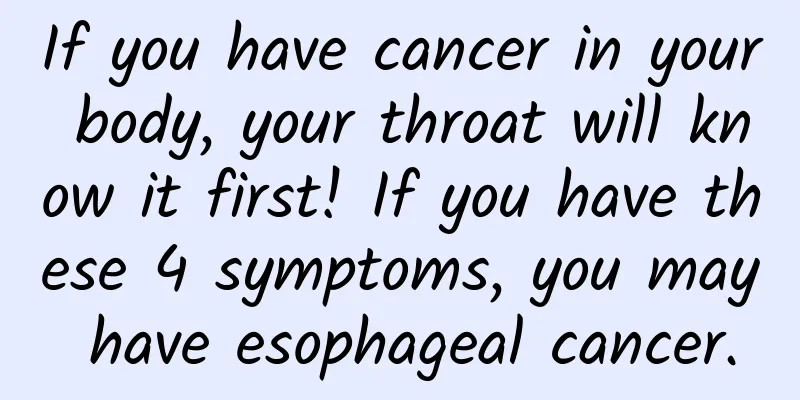If you have cancer in your body, your throat will know it first! If you have these 4 symptoms, you may have esophageal cancer.

|
Mr. Liu, 50 years old, was in good health and had a history of smoking and drinking. More than a month ago, when he was eating, he found that when he ate dry foods such as rice and steamed buns, he would feel choking and difficult to swallow, accompanied by pain when swallowing. At first, Mr. Liu didn't take it too seriously, thinking it was pharyngitis, so he went to the pharmacy to buy medicine to treat pharyngitis. However, after taking the medicine for a few days, the symptoms did not improve, and the feeling of "something stuck in the throat" became more and more severe. When eating, I found that I would feel choking when eating liquid food such as porridge and soup, and my weight gradually decreased, losing nearly 10 pounds in a month. This series of symptoms made Mr. Liu realize that there might be something wrong with his health, so he went to the hospital for treatment. After Mr. Liu was admitted to the hospital, routine blood tests, liver and kidney function, blood sugar, blood lipids, stool, etc. showed no obvious abnormalities. During the gastroscopy examination, it was shown that there was a tumor in the esophagus 25-33 cm away from the incisors, invading 3/4 of the esophageal wall. The surface of the tumor was eroded, congested, and nodular, with irregular ulcers formed. The texture was hard and it was easy to bleed when touched. The pathological biopsy showed squamous cell carcinoma in situ of the esophagus. For further treatment, the patient was admitted to the hospital for esophageal cancer. Finally, Mr. Liu was diagnosed with esophageal cancer and there was no metastasis to other parts of the body. The doctor recommended surgical treatment as soon as possible. After consultation and agreement with the family, an esophageal cancer resection was performed, during which the lesion was completely removed. The operation went smoothly. After the esophageal cancer was successfully removed, Mr. Liu started to eat liquid food on the second day after the operation. He found that the choking feeling after eating had been significantly reduced. At present, the choking feeling when eating has basically disappeared, and he can eat soft food. Doctors remind: If you have difficulty swallowing when eating, it often indicates that there is a lesion in the esophagus. Do not be careless and seek medical attention in time. Esophageal cancer, also known as esophageal cancer, is a relatively common digestive tract tumor. It is a malignant tumor that occurs in the esophageal epithelial tissue and accounts for 2% of all malignant tumors. About 300,000 people die from esophageal cancer every year worldwide, and my country accounts for 50% of the world's total esophageal cancer incidence, which means that half of the world's esophageal cancer is in China! The age of onset of esophageal cancer is mainly between 50 and 70 years old, with a peak age of 60 to 65 years old. Generally, it is higher in males than in females. When esophageal cancer occurs, many people mistakenly think it is pharyngitis. Once these 4 symptoms appear in the throat, do not ignore them, as they may be early manifestations of esophageal cancer. 01 Difficulty swallowing The typical symptom of esophageal cancer is difficulty in swallowing food, which first causes difficulty in swallowing solid objects, then difficulty in swallowing semi-liquid foods, and finally difficulty in swallowing liquid foods such as water and milk. Normal people do not feel any strange sensation in their throat when eating food. Once you have esophageal cancer, you will feel extremely uncomfortable when swallowing food, and swallowing will be difficult and not smooth. 02 Foreign body sensation in throat About 1/5 of patients feel a foreign body sensation in the esophagus when swallowing, and are unable to spit it out or swallow it. Generally speaking, when this phenomenon occurs, most people will think they have pharyngitis, but this phenomenon is actually one of the early manifestations of esophageal cancer. However, there are certain differences between the early manifestations of pharyngitis and esophageal cancer. For example, patients with esophageal cancer will feel a stronger foreign body sensation when eating and have more difficulty swallowing. Therefore, when you encounter this situation, it is best to go to the hospital for a check-up, identify the cause, and receive timely symptomatic treatment. 03 Painful swallowing Patients with esophageal cancer will experience particularly strong pain in the throat in the early stages whenever they eat or drink, which is similar to the symptoms of tonsillitis. The main symptoms of tonsillitis include swollen tonsils, fever, throat discomfort, throat pain, and even difficulty swallowing and breathing. In addition to swallowing pain, difficulty swallowing, and foreign body sensation when swallowing, esophageal cancer is often accompanied by pain behind the sternum, such as needle-like or pulling pain, and may also be accompanied by a burning sensation. 04 Tight, dry throat Esophageal cancer can lead to a decrease in the ability of the esophagus to secrete mucus, which can easily cause dryness in the throat, accompanied by an abnormal feeling of tightness. In other words, no matter how much water esophageal cancer patients replenish, their throats still feel tight and dry. Is esophageal cancer caused by eating? Survey data show that esophageal cancer may be a disease caused by multiple factors, and the population distribution of esophageal cancer is related to age, gender, occupation, race, region, living environment, eating habits, genetic susceptibility, etc. The most common causes are: 1 Pickled Food Pickled foods contain a large amount of nitrite, which is likely to be converted into nitrosamines after entering the human body. Nitrosamines are a highly carcinogenic substance. Studies have found that the nitrite levels detected in the diet, drinking water, and even saliva of people in areas with a high incidence of esophageal cancer are much higher than those in areas with a low incidence. 2 Fungal infections A variety of fungi can be isolated from food in certain high-incidence areas, the upper digestive tract of esophageal cancer patients, or resected esophageal cancer specimens, some of which have certain carcinogenic effects. Some fungi can promote the production of nitrate precursors, thereby promoting the formation of cancer. 3 Deficiency of vitamins and trace elements Lack of vitamin A, vitamin B2, vitamin C and animal protein, and insufficient intake of fresh vegetables and fruits are common characteristics of areas with a high incidence of esophageal cancer. In addition, there is a lack of trace elements, such as iron, zinc, fluorine and selenium. These trace elements are generally found in relatively low levels in grains and vegetables, and are also related to the region. 4 Hot food, hot drinks Many people, especially the elderly, have the habit of "drinking while it's hot" and "eating while it's hot". However, this habit is extremely harmful to our esophagus. From the beginning of swallowing to the peristaltic wave reaching the end of the esophagus and entering the stomach, this process takes about 9 seconds. When the temperature of the swallowed food is too high, it will burn the esophageal mucosa and cause it to necrotize. If this continues for a long time, it is likely to lead to cancer in this area. Studies have found that the highest temperature that the human esophagus can tolerate is around 40~50℃. When ingesting food with a temperature >65℃, it will cause burns to the esophageal mucosa, which can easily induce inflammation. Repeated burns and repairs of the esophageal mucosa may cause cell malignancy and increase the risk of cancer. In addition, eating food that is too hard or eating too fast can also irritate the esophagus. If you eat too fast and do not chew thoroughly, large pieces of food may damage the esophageal mucosa; if you eat too hard food, the edges of hard objects may scratch the esophagus, causing damage to the esophageal mucosa or causing esophageal inflammation. Therefore, it is very important to change the habit of "eating while it's hot" to prevent esophageal cancer. Daily food should be kept warm, and food that is too hot should be cooled slightly before eating. 5 Smoking and drinking Tobacco contains more than 60 carcinogens. The smoke produced when smoking will adhere to the mouth and throat, and will also damage the esophageal mucosa. Long-term drinking can easily lead to damage to the esophageal mucosa, which can cause repeated damage and repair, and easily promote cancer. The risk of esophageal cancer in patients who drink frequently is 3 to 5 times that of normal people. 6 Esophageal reflux Frequent and persistent esophageal reflux, because the refluxed gastric acid and bile salts are chemical substances, will irritate the esophagus, cause damage to the esophageal mucosa, and produce chronic inflammation. Reflux esophageal disease has a type of Barrett's esophagus, which is closely related to esophageal cancer. It is a precancerous lesion of esophageal adenocarcinoma recognized worldwide, and its canceration rate is 30 to 50 times that of normal people! Because chronic chemical damage can lead to mucosal inflammation, there is a chance that the mucosa will become cancerous if it is partially repaired during the repair process. Therefore, chronic gastroesophageal reflux disease has the potential to become cancerous. 7 Genetic factors Esophageal cancer has a significant familial clustering phenomenon, so if there are similar diseases in the family, regular check-ups are necessary. Remember these 5 little things in life and stay away from esophageal cancer! 1. Eat warm food, avoid hot food, and remember to chew slowly; 2. Do not eat rotten or moldy food, and eat less pickled food; 3. Quit smoking and limit alcohol consumption; 4. Eat fruits and vegetables every day, and they cannot be replaced with each other; 5. Have regular physical examinations. -END- |
>>: In the hot summer, come and discover those colorful cicadas
Recommend
.NET is open source, Visual Studio starts to support Android and iOS programming and comes with an Android emulator
At the Connect() conference held early this morni...
The ultimate goal of palace fighting: to undergo sex change and become emperor!
There are many problems in the world that come fr...
Today is Minor Cold丨Be a snow-walking wild goose, be a snow-covered pine
"There are plum blossom trees at the foot of...
The marriage with Great Wall is just an ulterior motive. BMW’s future competitor in China may be Didi Dache!
Recently, Great Wall Motors and BMW Holding (Neth...
What is the 7±2 rule that almost all designers use?
Understanding the 7±2 rule and applying it to dai...
In winter, I want to sleep until I wake up naturally, and wake me up from my dream with a pee
Getting up to go to the bathroom at night in wint...
Why is it so difficult to convince the older generation? There is a term in psychology: the backfire effect
Have you ever tried to persuade someone, but foun...
How to install Windows 10 on your Mac
Many people like Apple's notebook products, w...
Interpreting ASP.NET 5 & MVC6 Series (8): Session and Caching
In previous versions, Session existed in System.W...
Highlights of APP free and paid channel promotion!
Before I did it, I had heard of various methods o...
When seeing a doctor, should you trust Baidu or your doctor?
In an era when Internet search is widely used, sea...
My practical experience in Android development
I have always wanted to write an article summariz...
Tesla has applied for a new patent to isolate defective battery cells to make batteries safer
According to foreign media reports, Tesla recentl...
How to design new product invitation activities to promote products themselves (Part 2)
This article is a summary of the results of a use...
A fast integration framework: MVP+Dagger+mainstream framework, it is enough
Preface In the Android technology circle this yea...









